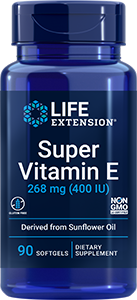- Science & Research
- Science News
- Newsletter
- 2005
- September 3

Newsletter
Newsletter
High dose vitamin E supplementation extends median and maximum lifespan in mouse study
| ||||||||||||||||||||||||||||||
| ||||||||||||||||||||||||||||||
| Life Extension Update Exclusive High dose vitamin E supplementation extends median and maximum lifespan in mouse study
A report published online in the American Journal of Physiology-Regulatory, Integrative and Comparative Physiology (http://ajpregu.physiology.org) revealed the findings of researchers from the University of Cadiz in Spain and the University of Buenos Aires in Argentina that feeding mice high doses of vitamin E increased lifespan and improved neurological performance. Professor Alberto Boveris of the University of Buenos Aires and colleagues used a senescence accelerated strain of mice whose median lifespan is 60 to 70 weeks and whose maximum lifespan is 100 to 120 weeks. (Maximum lifespan is the greatest amount of weeks, months or years a species has been observed to survive, while median lifespan is a middle value determined from the range of survival times.) Starting at 28 weeks of age, the researchers supplemented the diets of male and female mice with doses of alpha-tocopherol comparable to the 1200 to 2000 milligram doses taken without adverse effects in studies involving Alzheimer’s disease patients. A control group received diets that contained the standard amount of vitamin E. Male mice received the greatest benefit from high dose vitamin E supplementation, with a 40 percent increase in median lifespan and a 17 percent increase in maximum lifespan. Supplemented male mice also showed greater neuromuscular performance and cognitive exploratory activity than unsupplemented mice over the course of the study, and this difference increased with age. Female mice, whose median lifespan was improved by only 14 percent, were not tested for neurological performance. Although the female mice did not experience an increase in maximum lifespan associated with vitamin E, maximum lifespan for both supplemented and unsupplemented females was greater than that of males, which has been explained by lower mitochondrial oxidant production and the effect of estrogen on down-regulating oxidant production. The team also found that the increased mitochondrial content of lipid and protein oxidation products in the brains and livers of older mice was partly prevented by vitamin E. Vitamin E also helped reduce the age-associated decline in mitochondrial enzymatic activity in the brain and liver. Professor Boveris explained that the results "are in line with the free radical theory of aging put forward by Gerschman and Harman in the 1950s. Our results show a significant negative correlation between the mitochondrial content of the oxidation products of free-radical mediated reactions and mitochondrial enzymatic activities. Moreover, brain mitochondrial enzymatic activities were linearly related to mice success in the tests of neuromuscular function and of exploratory and cognitive activity and to the maximal mice life span.” The authors conclude that further studies are needed “to suggest a threshold for the vitamin E doses that provide beneficial effects in the neurological function in aging mammals, an effect that is likely mediated by the antioxidant properties of alpha-tocopherol.” | ||||||||||||||||||||||||||||||
| Protocol Age-associated mental impairment Numerous published studies indicate that brain aging can be controlled, at least in part. Some of these research findings demonstrate a preventive effect, whereas others show a benefit in reversing the neurological impairment caused by normal aging or by an age-related condition such as having had a stroke. Free radicals are atoms with unpaired electrons that can cause damage to cells by a process known as oxidation. Brain cells are particularly vulnerable to the effects of oxidation because of their high-energy production. The more energy a cell produces, the greater the number of damaging free radicals. The destructive effects of excess free radical activity have been implicated in many disease processes, including Alzheimer's disease and Parkinson's disease. Antioxidants neutralize free radicals and help prevent some of the damage associated with normal brain aging. A study in the Journal of the American Geriatric Society compared groups of older people over time and at a given time with regard to antioxidant intake and memory performance. The study found that free recall, recognition, and vocabulary were significantly related to vitamin C and beta-carotene levels. The levels of these antioxidants were found to be significant predictors of cognitive function even after adjusting for possible confounding variables (Perrig et al. 1997). For protection from the many types of free radicals to which it is vulnerable, the brain needs a wide variety of antioxidants. | ||||||||||||||||||||||||||||||
| Featured Products | ||||||||||||||||||||||||||||||
| ||||||||||||||||||||||||||||||
| Questions? Comments? Send them to ddye@lifeextension.com or call 1-800-678-8989. For longer life, Dayna Dye Sign up for Life Extension Update at https://mycart.lifeextension.com/subscribe.asp Help spread the good news about living longer and healthier. Forward this email to a friend! View previous issues of Life Extension Update in the Newsletter Archive. | ||||||||||||||||||||||||||||||
The latest news on aging, nutrition, and vitamins
Lab
Testing
How Life Extension lab testing works



